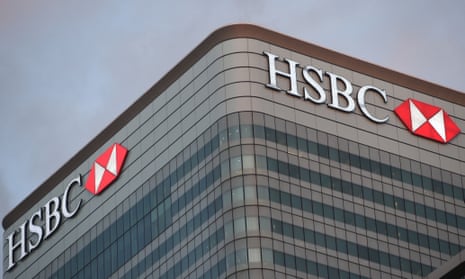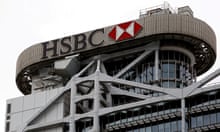HSBC reported $5.8bn in first-quarter profit, a near-80% jump, as improving economic forecasts allowed the bank to release hundreds of millions of pounds of bad debt provisions made to cover potential defaults linked to the Covid crisis.
Executives said they were still cautious but feeling more optimistic than in February, partly owing to the success of vaccine rollouts in big markets including the UK.
It meant the bank was able to release $435m (£313m) of the $8.8bn it put aside to cover bad debts during 2020, when lenders worried that a wave of business and personal customers would fail to keep up with their loan payments.
The cash boost helped raise pretax profits by 79% to $5.8bn over the three months to March, compared with $3.2bn during the same period last year when the Covid crisis first started gathering pace in Asia and Europe.
While HSBC’s Asian operations accounted for approximately 60% of its earnings, all of its regions turned a profit. The lender’s ringfenced bank, HSBC UK, reported $1bn in pretax profits for the first quarter, more than the $246m for the whole of 2020.
“We are feeling more optimistic about the rest of the year than we did in February,” the HSBC chief executive, Noel Quinn, told journalists. However, Quinn said he was “cautious” about the bank’s performance, given the uncertainty surrounding the pandemic, and the slow reduction in government Covid support.
He credited the UK government’s emergency Covid programmes, which included furlough and special loan schemes, for helping support business and personal customers. “That has definitely protected the UK economy from some of the significant downside risk that could have emerged as a consequence of the pandemic” Quinn said.
He added that the recent vaccine rollout “has really given us the confidence that the UK economy has the potential to rebound”.
The bank also benefited from the UK’s booming mortgage market as homebuyers rushed to take advantage of the government’s stamp duty holiday, and started to prioritise larger homes and gardens due to a surge in homeworking.
Quinn confirmed that the bank was consulting staff about future work arrangements, saying that while some preferred permanent homeworking, others wanted to be in the office full-time, and some wanted hybrid schedules. “We haven’t got any definitive numbers as to how that will eventually play out globally,” Quinn said.
HSBC plans to slash its global office space by nearly 40% after the pandemic, as part of sweeping cost cuts.
The plans involved the loss of up to 35,000 jobs. The bank cut 11,000 full-time and contractor roles in 2020, leaving it with approximately 232,000 workers worldwide at the end of the year.
Overall, the results lifted HSBC shares, which rose more than 4.1% on Tuesday to 440p each.
But Susannah Streeter, a senior investment and markets analyst at Hargreaves Lansdown, warned that “HSBC’s resilience could be tested as governments remove the arms of support that have been wrapped around their economies to help them limp through the crisis”.
She also cautioned that low interest rates would continue to drag on the bank’s revenues, which fell 5% to about $13bn, down from $13.7bn a year earlier. It comes after UK interest rates were cut to record lows of 0.1% at the start of the pandemic last year.
“It doesn’t look like there is an immediate cure for the bank’s underlying ailment, the ultra-low rates plaguing the banking sector,” Streeter said.
“HSBC is not alone in feeling the squeeze of net interest margins, which tightened again slightly over the quarter, but other banks with huge investment banking arms have been able to capitalise on the trading surge over the past year,” she said, referring to major US lenders such as JP Morgan and Goldman Sachs, which reported bumper first quarter profits earlier this month.









